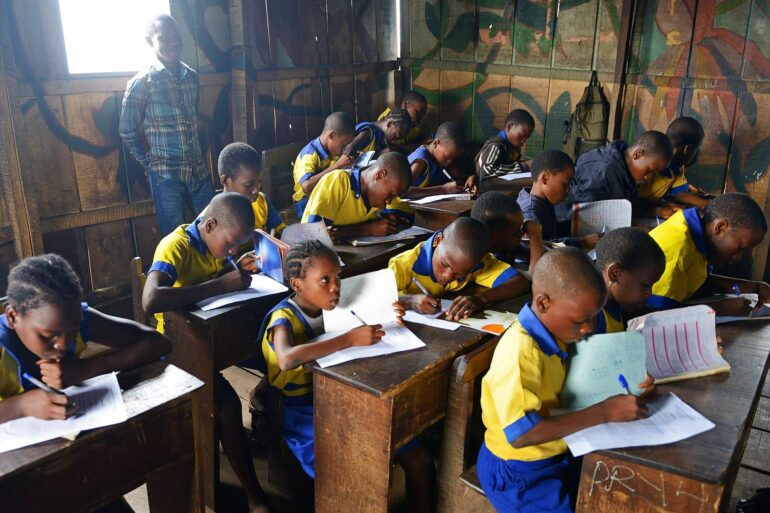TL;DR:
- The Federal Government is advised to include Artificial Intelligence (AI) in the school curriculum to save teachers’ time and make learning fun.
- Afrelib Academy is focused on promoting literary and technology appreciation in West Africa, starting with Nigeria.
- The academy curates innovative EdTech platforms and teaching practices from around the world for better educational outcomes.
- Some schools in Nigeria face challenges like broken classrooms and teachers without access to smart devices.
- Limited resources and paper-based methods hinder teaching and monitoring student progress.
- Afrelib Academy partnered with PAGS Profile, an AI-enabled assessment tool, to bridge learning gaps exacerbated by the pandemic.
- Teachers can save time by using technology and AI tools like ChatGPT to create lesson plans quickly.
- Afrelib Academy aims to prepare educators and learners for the future by providing necessary skills and confronting challenges.
- The integration of AI into the curriculum will enhance educational outcomes in Nigeria.
Main AI News:
The inclusion of Artificial Intelligence (AI) in the school curriculum has been recommended to the Federal Government, as it emerges as one of the prominent global technologies. Joyce Gomina, the Head of Operations/Programme at Afrelib Academy, emphasized the benefits of this move, highlighting that it would not only save teachers’ time but also make the learning process enjoyable.
At Afrelib Academy, several initiatives have been introduced to foster literary and technological appreciation, ultimately leading to enhanced education outcomes in West Africa, starting with Nigeria. Gomina emphasized the importance of recognizing every child’s unique voice and the academy’s commitment to supporting learners, parents, teachers, and schools in achieving the best educational results. In pursuit of this goal, the academy curates innovative EdTech platforms and successful teaching practices from around the world to deliver superior educational outcomes on a larger scale.
Gomina further shared an insightful encounter with an independent school in the FCT region of Nigeria. Despite facing challenges such as broken classroom windows and teachers lacking access to smart devices for teaching resources on apps or platforms, these educators showcased immense passion and enthusiasm. The school’s head teacher even funded necessary equipment personally when parents were unable to afford them. However, such schools often grapple with limited resources and tools for teaching, as well as paper-based methods to monitor and track children’s progress, which often lack quality. Consequently, acquiring the necessary skills for future employment becomes an uphill battle right from the start.
To bridge these gaps and mitigate the learning disparities exacerbated by the Covid-19 pandemic, Afrelib Academy partnered with PAGS Profile—a cutting-edge, AI-enabled online assessment and progress monitoring tool. This collaboration enabled the academy’s team to gain unique insights into children’s learning processes, identify gaps in knowledge and skills, and provide teachers with effective strategies and resources to address these gaps. This initiative proves particularly valuable for children with additional learning needs, who are often overlooked or left behind, perpetuating their potential for failure.
By harnessing technology and leveraging the power of Artificial Intelligence, teachers can dramatically reduce the time spent on researching and gathering various tools for teaching specific topics. For instance, using ChatGPT, a teacher can create a comprehensive lesson plan in under 10 minutes.
Additionally, the plan can be easily customized within a similar timeframe or even less. Introducing technology and AI in classrooms would not only save teachers valuable time but also create a more enjoyable teaching and learning experience.
Afrelib Academy’s approach revolves around diligently monitoring the trajectory of the future and ensuring that educators and learners are equipped with the necessary teaching and learning skills to thrive in that future. The academy stands firm in its commitment to preparing children for the future without compromising their potential by shying away from the challenges that lie ahead.
Conlcusion:
The inclusion of Artificial Intelligence (AI) in the school curriculum has significant implications for the market. By integrating AI technologies, the education sector can revolutionize teaching and learning methods, leading to improved educational outcomes.
This shift opens up new opportunities for businesses operating in the EdTech sector, as the demand for AI-powered educational tools and platforms is expected to rise. Companies specializing in AI-driven solutions for schools and educators can capitalize on this growing market by offering innovative products and services that cater to the evolving needs of educational institutions.
Moreover, the successful implementation of AI in the education sector can also contribute to the development of a digitally skilled workforce, fostering a competitive advantage for businesses in the broader market. Overall, the integration of AI in the school curriculum presents a promising market landscape for businesses keen on leveraging technology to drive educational advancements.

